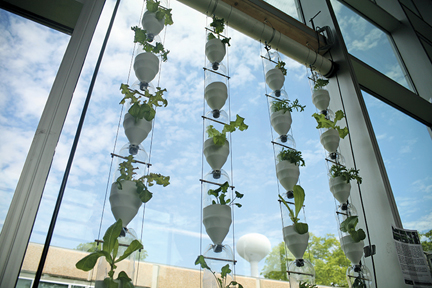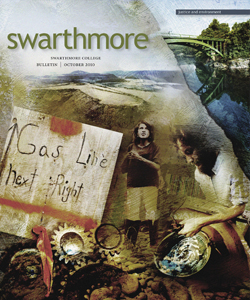A Ladder of Lettuce and Other Green Things
The greening of Swarthmore continues.
Anyone walking through the science center’s Eldridge Commons this summer might have been initially puzzled by the sight of pots of leaves strung in ladder-like wire contraptions from top to bottom of the Commons’ expansive windows. On closer observation, it could be seen that the pots contained lettuce plants. Students from the Good Food Project had created a hydroponic window farm.
At the same time, students, alumni, faculty, and staff were collaborating on a project to create five acres of organically maintained lawn between Mertz Hall and Magill Walk?using only compost as a fertilizer instead of synthetic fertilizers and herbicides.
The ongoing sustainability efforts of the campus community are paying off. This year, Swarthmore is highlighted in a new Guide to 286 Green Colleges compiled by The Princeton Review and the U.S. Green Building Council. Rather than presenting a hierarchical list of “greenest” or “best,” the guide showcases schools according to whether students enjoy a quality of life that is both healthy and sustainable; the degree to which a school prepares students for employment in a green energy economy; and the level of environmental responsibility demonstrated by the school.
The book highlights Swarthmore green initiatives such as the Sustainability Committee; use of renewable wind power to meet 40 percent of the College’s electrical demands; 14,300 square feet of green roofs; the Scott Arboretum and Crum Woods as natural learning facilities that are an integral part of 35 courses in 12 departments from which majors in environmental studies can be constructed; engineering and science projects that focus on local environmental issues; the student-run Good Food Project, which works on sustainable food issues with local communities, maintains its own community garden, has initiated a composting program, and advocates for sustainable food issues and fair food; and the College’s Career Services Office, which serves as a center for guiding students toward externships and internships and employment in the areas of sustainability and the environment.
 Email This Page
Email This Page
